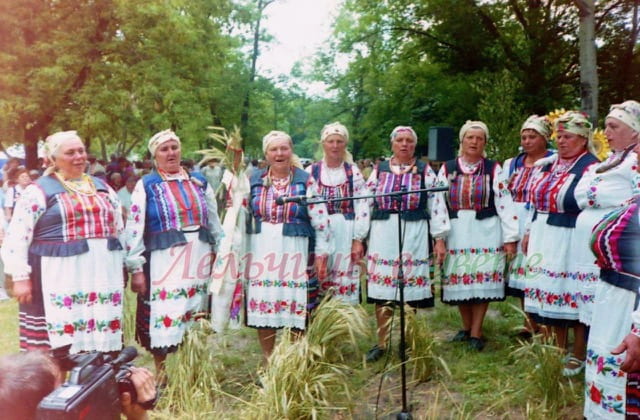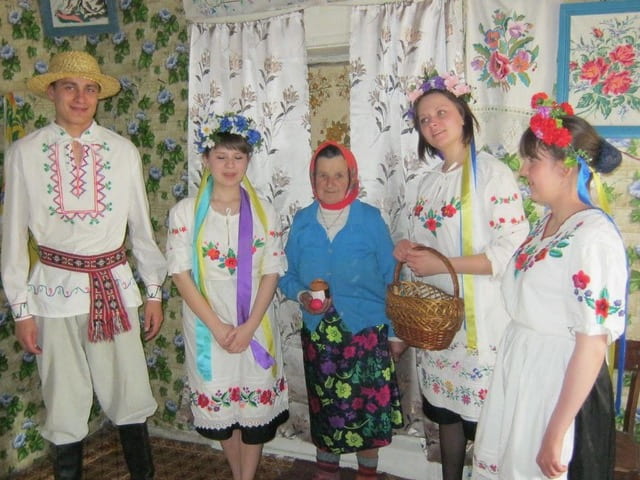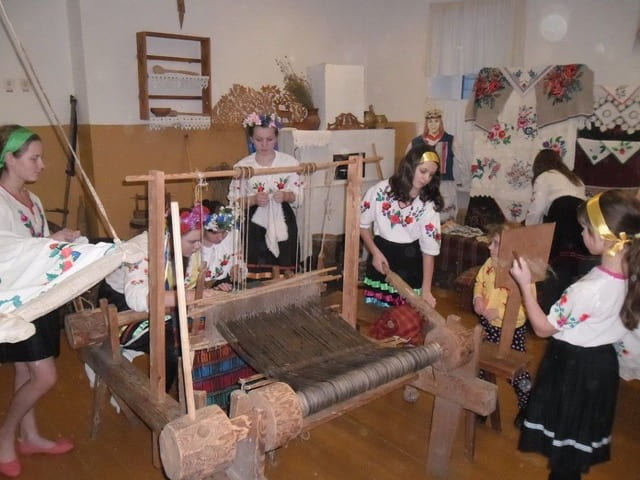This story is about Belarusians of Ukraine, natives of a large family from the Belarusian Polessia in the time of Russo-Ukrainian war.
Belarusian Polessia is located in the south of the Republic of Belarus and borders Ukraine. This is land is beloved by the people who live there, whose melodious speech tends to be long-winded and includes many Ukrainian and Polish words.
The main wealth of this region is the forest and everything that grows and lives there. The forest is especially rich in berries, such as strawberries, blueberries, lingonberries, raspberries, viburnum, blackberries, cranberries, red currants and others. Innumerable species of trees, wild birds, and wild animals live in the forests and swaps that are difficult for people to cross. It is impossible not to mention the unique king-oak located in the Lelchytskyi district, the oldest oak tree in Belarus.

And among this natural beauty is our native village of Dubrova, Lelchytsky District, whose history dates back to 1551. Our family was born in this village. Our parents had six children. I was the first to be born in 1951. I think that my parents had no problem with what name to give me. The fact is that a very common flower called cornflower grows in Belarus (in Belarusian, vasil’ok).
The cornflower personifies the Belarusian people: modest, friendly and hospitable. Almost every Belarusian family has a boy or an adult man named Vasil. This shows a great respect for one of the symbols of the Belarusian people.
After graduating from secondary school in 1968 in Belarus, I went to the Ukrainian city of Kharkiv to enter university. I received a higher education at the Kharkiv Polytechnic Institute and decided to live in this city. Besides me, my parents had three more sons and two daughters.
After graduating from secondary school, my younger brother Fyodor came to Kharkiv to study at the V. N. Karazin Kharkiv National University, and afterward he worked as a mathematics teacher in one of the rural schools of the Kharkiv region until he retired.
Then, after graduating from high school, my sister Kateryna came to the city Kharkiv, and she worked in one of the city’s factories. Now she is known as a confectionery specialist.
After Kateryna, our twin siblings came to Kharkiv after graduating from school – our brother Uladzimir and sister Nadzeya. They worked on lathes at a factory. Then Uladzimir also studied at Kharkiv Polytechnical Institute, and after graduating, he worked in management positions in the city’s businesses.
Our brother Mikhail was the last to come to Kharkiv after graduating from school. He worked at a factory, and after serving in the army he returned to Belarus, where he still lives in our parents’ house.

Our parents have six children. Each of us has a whole inner world with our own character, views on life, with our own abilities – what distinguishes us from each other. But we have a lot in common. The main thing is respect and love for our ancestors, whom we often remember; love for our village where we were born and where we grew up; and love and respect for Belarusian culture and the traditions of our people.
The full-scale Russo-Ukrainian war that began on February 24, 2022, completely changed our lives. We are painfully aware of the fact that Russian aggressors are shelling peaceful cities and villages of Ukraine from the territory of our native Belarus.
We Belarusians, for whom fate has made Ukraine a second Motherland, have a lot in common. Personally, for me, my brothers and sisters, our children and grandchildren, except for my brother Mikhail who lives in Belarus, the presidents of Russia and Belarus – Putin and Lukashenkо – are war criminals who should be punished by the International Military Tribunal in The Hague with the help of the international community.
For us, the residents of Russia and Belarus, who are supporters of the ideology of the dictators Putin and Lukashenka, are enemies.
And how should we treat war criminals? They came to our houses to kill us. During war time, our children do not have the opportunity to work quietly, and our grandchildren cannot study. The infrastructure of cities and villages is collapsing: hospitals, schools, universities, sports facilities, etc. are ruined.
Now my big family is scattered all over the world. My wife and I live in a summer house in the Kharkiv region. We plant and grow vegetables. My son is in the Armed Forces of Ukraine, at the front. My daughter is temporarily in Germany with my youngest grandson, and she actively participates in Brave Action, an international volunteer fund which helps Ukraine. My eldest grandson is in Kharkiv, and he is a student at Kharkiv University. And my other grandson is in Poland with his mom, where he is working and studying in a Ukrainian university.

My Brother Fyodor and his wife live in a village in the Kharkiv region, near Kupyansk. From February 25 to September 7, 2022, their village was occupied by the Rashists. There was no gas and electricity. They rarely even went outside that time. His son evacuated to Poland with his family.
My brother Uladzimir, with his three daughters and grandchildren, was in the city Cherkasy, in the center of Ukraine. Now he has returned to Kharkiv, working at a business.
My sister Kateryna with her husband and son’s family left for Canada in spring 2022. My sister Nadzeya is in Kharkiv. One of her sons works at a factory, and the other son is in the Armed Forces of Ukraine, at the frontline near Kupyansk.
Everyone from our family makes a contribution, though maybe not a big one, to the victory over the Russian aggressors.
We believe in the Armed Forces of Ukraine!
Ukraine will definitely win!
